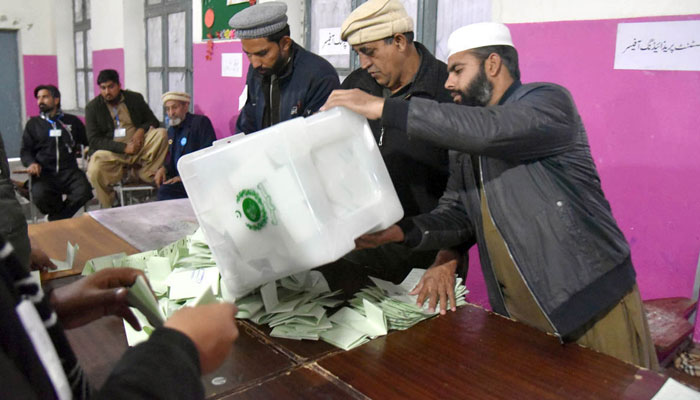Rigging petitions drop 340pc
Pakistan’s recent general elections, held on February 8, 2024, saw 87 complaints filed with the Election Commission of Pakistan
ISLAMABAD: In 2013, general elections were held on Saturday, May 11, to elect the members of the 14th National Assembly and the four Provincial Assemblies. Following the elections, a total of 411 petitions were filed with the Election Tribunals. Five years later, on July 25, 2018, Pakistan held general elections to elect the members of the 15th National Assembly and the four Provincial Assemblies. Again, a significant number of petitions, totaling 299, were filed after the results were announced.
Pakistan’s recent general elections, held on February 8, 2024, saw 87 complaints filed with the Election Commission of Pakistan (ECP). This number represents a significant decrease compared to the 299 petitions filed after the 2018 elections, reflecting a 70% drop. If petitions are any indication, the number of rigging allegations was 340% higher in 2018 compared to 2024.
Mr. Najam Ali has analyzed the geographical distribution of the 87 complaints filed with the ECP following the 2024 general elections. Of these complaints, 22 pertain to National Assembly seats, with 10 originating from Khyber Pakhtunkhwa, 7 from Punjab, 3 from Sindh, and 2 from Balochistan. Notably, PTI has publicly claimed that 80 National Assembly seats were “stolen” from them. Question: If 80 National Assembly seats were “stolen” from PTI, then why is it that only 12 petitions have been filed from Punjab, Sindh, and Balochistan?
Interestingly, of the 65 petitions filed for the four provincial assemblies, 43% originate from Khyber Pakhtunkhwa, where PTI has secured an overwhelming majority. This raises the question: Why does Khyber Pakhtunkhwa have a disproportionate share of both National Assembly and provincial assembly complaints?
To be certain, there has been a dramatic drop in electoral complaints from 2018 to 2024 – a 70% plummet. Question: Does it mark a genuine leap in electoral integrity? To be sure, social media has amplified a particular perspective, shaping perceptions of widespread rigging. The reality diverges significantly. Instead of perpetuating inflammatory online narratives, responsible journalism requires examining all sides of the issue.
-
 'Sinners' Star Recalls One Of The Coolest Scenes From Filming
'Sinners' Star Recalls One Of The Coolest Scenes From Filming -
 Eco-fashion Designer Amanda Navaian Sues King Charles Charity
Eco-fashion Designer Amanda Navaian Sues King Charles Charity -
 MGK's Flirty Comment On Megan Fox's Sultry Pics Fuels Reunion Buzz
MGK's Flirty Comment On Megan Fox's Sultry Pics Fuels Reunion Buzz -
 'He Was Really Reminiscing': Clinton Sparks Reactions After Being Caught Smiling At Epstein Photos
'He Was Really Reminiscing': Clinton Sparks Reactions After Being Caught Smiling At Epstein Photos -
 NASA Restructures Artemis Mission, Pushing First Lunar Landing To 2028
NASA Restructures Artemis Mission, Pushing First Lunar Landing To 2028 -
 Young Sebastian Bach: Wild Photos From His Long-haired Rock Star Era Amid Christina Applegate Confession
Young Sebastian Bach: Wild Photos From His Long-haired Rock Star Era Amid Christina Applegate Confession -
 Royal Family All Set To Show Unity As King Charles 'plans Abdication'
Royal Family All Set To Show Unity As King Charles 'plans Abdication' -
 Astronomers Spot Nearly Invisible Galaxy Packed With Dark Matter
Astronomers Spot Nearly Invisible Galaxy Packed With Dark Matter -
 Kim Jong Un Searches For Reason To Join Iran War In Viral Memes
Kim Jong Un Searches For Reason To Join Iran War In Viral Memes -
 Zach Braff Opens Up On Childhood Friendship With Singer Lauryn Hill
Zach Braff Opens Up On Childhood Friendship With Singer Lauryn Hill -
 Aryna Sabalenka Announces 'forever' With Partner Georgios
Aryna Sabalenka Announces 'forever' With Partner Georgios -
 Trump To Meet Tech Giants: White House Energy Pledge Aims To Shield Consumers Ahead Of Midterms
Trump To Meet Tech Giants: White House Energy Pledge Aims To Shield Consumers Ahead Of Midterms -
 Meghan Markle, Prince Harry Believe They Could Help King Charles, William As Royals Face Major Crisis
Meghan Markle, Prince Harry Believe They Could Help King Charles, William As Royals Face Major Crisis -
 Rob Rauscha Steps Away From Reality TV After 'The Traitors' Triumph: 'It's Not A Life I Want'
Rob Rauscha Steps Away From Reality TV After 'The Traitors' Triumph: 'It's Not A Life I Want' -
 Val Chmerkovskiy Shares Message With Fans After Hospitalization: 'Thank God, No Brain Tumour'
Val Chmerkovskiy Shares Message With Fans After Hospitalization: 'Thank God, No Brain Tumour' -
 China Achieves Breakthrough In High-speed Satellite-to-ground Laser Communication
China Achieves Breakthrough In High-speed Satellite-to-ground Laser Communication




